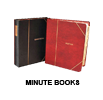US TOLL FREE: (888) 888-9120 |
| | | | | | | | | | | |
FREQUENTLY ASKED QUESTIONS |
|
|---|---|
Stock Certificates Class |
|
There are many different types of stock (shares) your corporation can issue. Common stock is what corporations usually issue to shareholders. Common stockholders receive a pro-rata share of the corporation's assets upon its dissolution. Common stock can be voting, or nonvoting. Holders of voting common stock get to elect the directors of the corporation, and thereby exercise control of the corporation. Holders of nonvoting common stock do not get to elect the directors, but they still receive their pro-rata share of the corporation's assets upon its dissolution. Common stockholders are eligible to receive quarterly dividends if corporate profits allow. |
|
Authorized Shares |
|
This is the TOTAL number of shares your corporation will ever have. This number is stated in the articles of incorporation. You can only change this number with the approval of a majority of shareholders and by amending the articles of incorporation. When authorized shares are "given out" to the shareholders, they become "issued" shares. |
|
Omit |
|
When selecting stock certificate class or par value you are given the option to "omit" this will allow you to make no reference on the stock certificate to either the class and/or par value. |
|
Multiple Class Reflecting Stock Certificates |
|
Up to 4 classes of Stock Appear on the face of each Certificate with a Total Authorized issue in the Center of the Certificate. The Certificates are typically differentiated by color, prefix & the fully paid line (i.e. fully paid and non-assessable shares of Common Stock). There is an additional charge of $10 per class, if you are ordering 3 or more classes there will additional fees for the extra certificates provided. |
|
Multiple Class Non-Reflecting Stock Certificates |
|
Only 1 Class will be placed on each Separate book of 20 Certificates There will be no Total Authorized issue listed on the Certificate Books (this would not apply since the shares are listed on separate Stock Certificate books). The Certificates are typically differentiated by color, prefix & the fully paid line (i.e. fully paid and non-assessable shares of Preferred Stock). There is an additional charge of $34.00 per book of 20 Certificates. One book of Certificates are included with the kit. |
|
Par Value |
|
Par value of stock is a bookkeeping term that basically equates to price. If a share of stock has a par value of one dollar, then one dollar per share must be given to the corporation in order to purchase the stock. Buying 1,000 shares of stock with a $1 par value, will cost you $1,000. Stock can sell above or below its par value, but usually not on newly issued shares. No par stock is stock without par value, or a fixed price per share. No par stock can be issued at any price (what buyers will pay for it) since it does not have a fixed "face" value |
|
Clauses |
|
Clauses are restrictions placed on the Corporation and can usually be found within the Articles of Incorporation. Most stock certificates do not require clauses. The most common clauses can be found on the order form. You may elect to type in your own clause by choosing clause other. We will then place your special clause directly on the Stock Certificate for you. |
|
| Corpkit Legal Supplies: Toll free number (888) 888-9120, Fax Free 888-777-4617, e-mail: info@corpkit.com |
| Corporate kits | Single Class Corporate Kits | Multi Class Corporate Kits | LLC Kits | Partnership Kits | Nonprofit Kits |
| Stock Certificates | Blank Stock Certificates | Standard Wording Certificates | Custom Stock Certificates |
| Corporate Seals | Notary Seals | Rubber Stamps | Minute Books | Minute Book Binder | Estate Planners | Homeowner Records |







